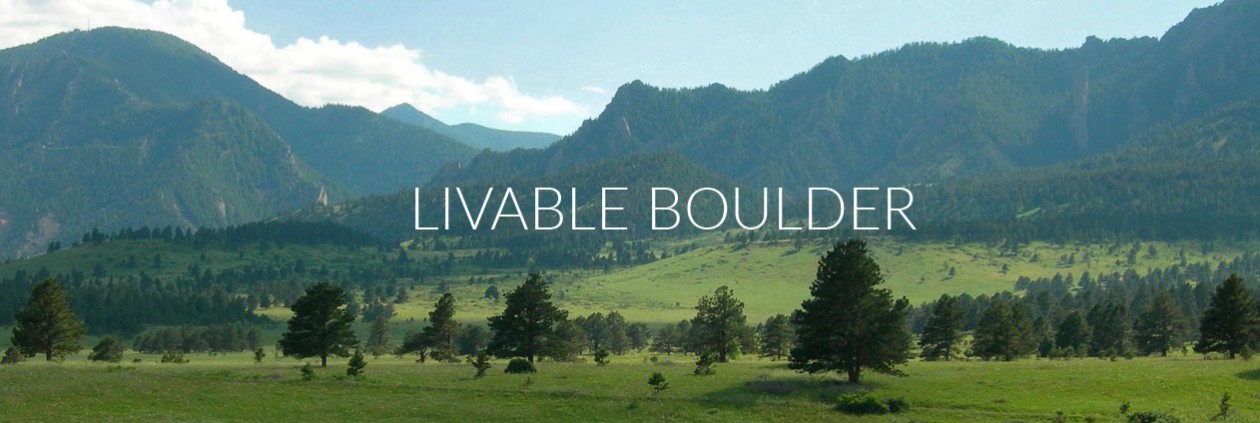Daily Camera, Boulder, CO
POSTED: 04/25/2015 08:48:12 PM MDT
I support the Neighborhoods’ Rights to Vote on Land Use Changes initiative. The city of Boulder has recently proposed a dizzying array of land-use changes for existing neighborhoods that would essentially ignore neighborhoods’ actual zoning. Many proposals have come from the planning department’s hand-picked “working groups” that lacked proportional representation from people opposed to the changes to the affected neighborhoods. The process ran so far off-track that City Council convened a special housing process subcommittee to try to right the process.
Since then, many residents have asked the city to allow all citizens to vote on competing visions for Boulder’s future, or at the very least,survey all residents to measure actual public sentiment for what they’re proposing. It remains unclear what the city will do, but a full-fledged democratic vote by the people doesn’t appear to be forthcoming.
With regard to neighborhoods, when people sink their life savings into a home, it’s a major commitment that tremendously stretches their finances and monthly budgets. They don’t make the decision lightly or arbitrarily. People buy into a neighborhood with the reasonable expectation that their property values won’t decrease due to zoning changes in which they had no voice.
Most importantly, I believe that neighborhoods themselves know their neighborhoods best. They know the challenges, issues, and likely success or failure of various proposals. The problem is that city officials, and some outspoken zealots, profess to know what’s best for your neighborhood, though they’ve hardly spent a moment there. They want to re-design and re-engineer your neighborhood, but don’t want you or your neighbors to have a say. This is precisely why neighborhoods should have a pathway to voting.
Here in Martin Acres, we welcomed and happily co-exist with Alvarado Village, one of Boulder’s first affordable housing efforts. And we recently welcomed the Bridge House, a multi-unit transition home for formerly homeless individuals. We embraced these proposals because we knew our neighborhood, and knew these would work. We live here, and know traffic levels, noise, and parking issues and can actually predict with accuracy what things might work and which won’t. Just knowing that citizens have a right to referendum on a change proposal will encourage the city to do a better, more inclusive job on anything they propose. If they do a good job, a neighborhood referendum won’t be needed.
A stereotyped narrative, embraced by the city, is that young people prefer urban density to suburban situations. However, facts actually support the opposite. The American Community Survey, released earlier this year, found that most young professionals still want a traditional suburban experience, complete with single-family homes and yards. (For Boulder purposes, we can use our single-family neighborhoods to represent “suburbs.”) According to the U.S. Census Bureau, 529,000 Americans ages 25 to 29 moved from cities out to the suburbs in 2014; only 426,000 moved in the other direction. Among younger millennials, those in their early 20s, the trend was even starker: 721,000 moved out of the city, compared with 554,000 who moved in.
Thus, the city’s efforts to change Boulder single-family neighborhoods into dense, urban-style settings, with high intensity of use and impact, may well be flawed. Many people, even the young, seek single-family, suburban-style neighborhoods. If Boulder insists on aggressively changing single-family neighborhoods into something else, people will simply seek these neighborhoods elsewhere — most likely, somewhere further down U.S. 36. Our 60,000 daily in-commuters will simply increase. It would be a shame if Boulder neighborhoods are sacrificed for an ultimately flawed experiment like this, with no say from the neighborhoods.
A critic said neighborhoods aren’t capable of intelligent planning. I have more faith in neighborhoods and neighbors. Affording them checks and balances through the democratic process is appropriate. Before anything happens, 10 percent of registered voters in the neighborhood would have to sign a petition asking for a vote. This itself is a high hurdle. But it’s worth remembering that citizens petitioning their government is a constitutional right. In the coming weeks, ask yourself why opponents will be so committed to you not having a vote on what happens in your neighborhood.
The macro question of whether neighborhoods can have a pathway toward voting will appear on the November ballot only if enough people sign a petition requesting it. I’ll sign that petition, and encourage you to, as well.
Mike Marsh and his wife Lisa live in a net-zero single family home he built in south Boulder.
